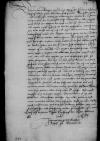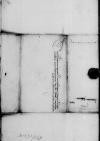Den ersamen unnd namhaftigenn herrn ⌊burgermeistern und rathmannen der ckoniglichen stadt Danntzig⌋, unsernn besundern, gutten freunden
Unsern freundtlichen gruus und alles gutts zuvoran. Ersame, nahmhafftige herrn, besundere, gutte freunde. /
Wir haben gerne Ewer Erbarkeit wilferigen willen yn enderung der wortter yn unserem vorigen brif / yn der pautzker sache auf dersulbten bitte / ertzeigt unnd sunst von wegenn der tzeise an ⌊königliche maiestet⌋, / domit dovonn Ewer Erbarkeit etzwas mogte zugeeignet werden, geschrybenn, / welche unsere ⌊⌋ wir och noch Ewer Erbarkeit beger datirt / und deren botten underschedlich neben den copeyen, / domit eyner vor den andern moge gekennet werden, / uberanthwort. Und so wir Ewer Erbarkeit viel inn den sachen, unserm lieben ⌊vatterlande⌋ zum besten, / erhalten konden, / thetten wir das zu iderer zeitt unbeschwert. / Es gelanget och an diesulbte Ewer Erbarkeit unsere freundtliche bitte, / die wir vonn wegenn unsers alten bekantten freundes ⌊magistro Iacobo⌋, / den Ewer Erbarkeit am negsten an uns abgeferttiget hette, / zwthuen bewogenn, / den wir nu fast lange kennen / und seine gethreue unnd schwere dinst, / die er nu viel jar, / och mit geferlikeitt seynes leibes, der gutten ⌊stadt⌋ und Ewer Erbarkeit gethan / unnd dorynn gebraucht worden ist, also das er dadurch sein alter bekommen / und nu fortmer vleissiger vorsehung benotturftig, / welches denn Ewer Erbarkeit wolle anmercken / und des genantten magistrum Iacobum, / als der solchs wol vordinet / und noch vordinen wirdt, / auf unsere vorbit genissen lassenn, / damit er in seinem alter durch Ewer Erbarkeit zuthun bass mogte vorsehen / und vorsorget werden, / dorinn den Ewer Erbarkeit, / die wir Gotte dem allmechtigen bevelhen, / dem alten gebrauch, / dass man emeritos militos irer gethreuen dinste genissen lassen, wirdt nachkommen / und uns eyn sunderen gefallen, / stets mit freundtlichem und zugethanen willen zuvorschulden, / thun wirt.

